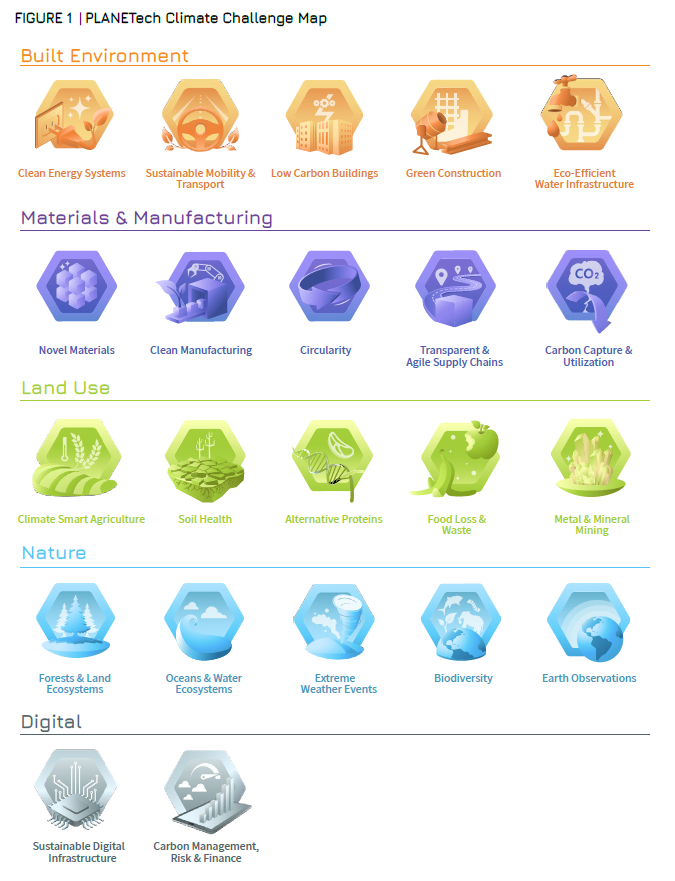Climate tech companies are mapped according to the relevant climate challenges addressed by their innovation. The methodology section begins by describing the PLANETech Climate Challenge Map and then details the compilation of the database used for the analysis and the mapping procedure.
Complementary information was also collected directly from climate tech startups through a survey circulated especially for this report.
PLANETech Climate Challenge Map
The PLANETech Climate Challenge Map presents the main challenges to successful climate change mitigation and adaptation, across all activities of our daily life and natural ecosystems. The 22 challenges are distributed across five climate challenge areas: The Built Environment, Materials & Manufacturing, Land Use, Nature, and Digital (Figure 1). Each of the 22 challenges encompass explicit sub challenges.1Details on each of the climate challenges and sub-challenges can be found at https://www.planetech.org/challenge-areas
The challenges target the reduction of emission sources, enhancement of carbon sinks, as well as community, nature, and infrastructure resilience. Innovative solutions based on diverse technologies can provide a response to any specific challenge.
The PLANETech Challenge Map provides a common platform for the Israeli climate tech ecosystem by aligning startups, directing finance, and providing context for policymakers. It has also been adopted by the European Institute of Innovation and Technology (EIT) in their mapping of four European climate tech ecosystems.
Mapping of Climate Tech Startups
The database compiled for the mapping presented in the report is based on the database used for mapping the ecosystem in 2022.2State of Israel’s Climate Tech, 2022 Startups were included in the database if one of their products or services addresses at least one of the PLANETech climate challenges.
The database includes companies founded since 2003 that have raised investments, as well as young companies founded less than 7 years ago, that have yet to raise funding. The 2022 database was revised to exclude older companies and startups that have since closed or are now inactive. Startups added to the database were those established since the last report, not previously identified, or startups that have pivoted to include a climate agenda in their core business.
Investment data was taken from IVC, Crunchbase, and Start- Up Nation Central. Investment amounts were extracted for each company’s completed funding rounds together with the investors’ identity, type (e.g. angel, VC) and headquarters’ location.
A startup’s innovation, be it a product, service, or a platform, may address numerous challenges, however, the analysis presented in this report relates to a startup’s main challenge.
Challenges are designated by the sector attribution of the innovation, it’s functionality, the technology it is based on, how and where it is applied, and (in the case of material products) how it is generated.
The PLANETech Startup Platform presents Israeli climate tech startups and displays the relevant climate challenges each one addresses.3https://www.planetech.org/startups-platform

